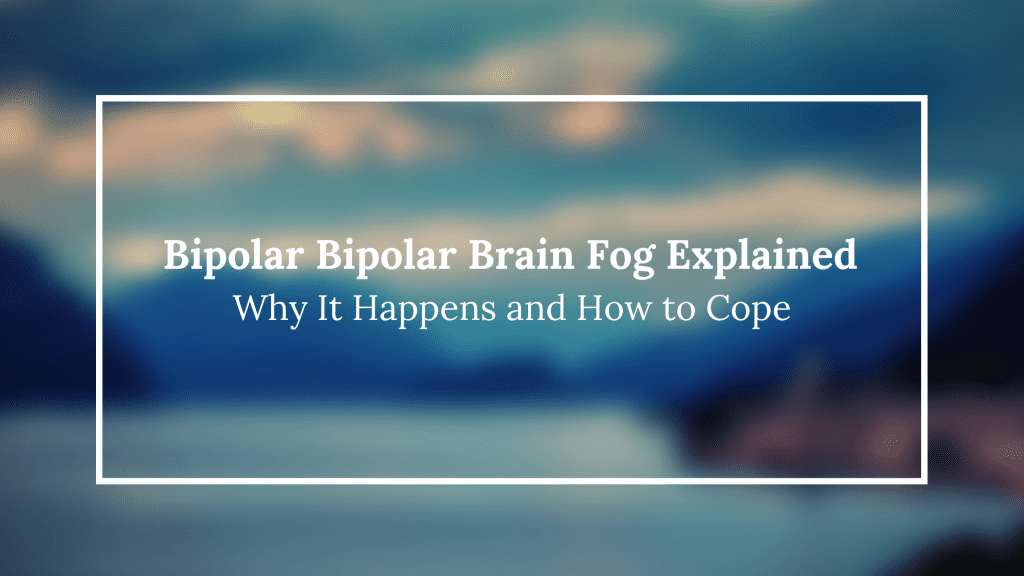Bipolar Brain Fog Explained
What is Bipolar Brain Fog?
Many people with bipolar disorder say that feeling “foggy,” slow, or forgetful can be just as frustrating as mood swings. If you’ve ever struggled to think clearly or remember simple things, you’re not alone. In this blog post, we’ll break down what bipolar brain fog means, why it happens, and what you can do about it. Don’t worry… it’s temporary.
“Brain fog” is a term used to describe when you feel mentally sluggish, cloudy, or not as sharp as usual. For people with bipolar disorder, brain fog can show up as:
Trouble focusing or paying attention in school or at work
Forgetting what you were saying or what you wanted to do
Feeling like your thoughts are slow or fuzzy
Having a hard time remembering names, dates, or directions
Feeling disconnected from yourself, like you’re in a dream or watching life happen from far away
These symptoms can be very upsetting and disruptive, especially when they happen on days when your mood seems fine. Let’s look into
For more guidance on bipolar disorder, check out our book and masterclass to reclaim control of your life. You can also check out our free resources.
Why Does Brain Fog Happen in Bipolar Disorder?
Experts have found several reasons why bipolar brain fog happens. Here are some of the most common:
1. Changes in the Brain
Bipolar disorder may change the way some parts of your brain work, especially areas that control attention, memory, and planning. These changes can make it harder to think quickly or remember things.
2. Mood Episodes
When you’re feeling very depressed or very manic, your brain is under a lot of stress. This can make it hard to concentrate, finish tasks, or even understand what’s being said to you. Brain fog can last even after these mood swings are over.
3. Medication
Some medicines used to treat bipolar disorder can have side effects that make you feel tired or add to brain fog. For many people, though, medicine helps them more than it hurts—but it’s okay to talk to your doctor if you think your medication is making things worse.
4. Lack of Sleep
People with bipolar disorder often have trouble sleeping. Not sleeping enough or sleeping at odd times can make symptoms of brain fog way worse.
5. Stress and Physical Health
Stress, poor nutrition, not enough exercise, or physical health problems (like diabetes) can add to brain fog. Taking care of your body helps your brain work better, too.
What Does Bipolar Brain Fog Feel Like?
If you live with bipolar brain fog, you’re probably used to things like:
Feeling like you’re “not yourself”
Struggling to do schoolwork or homework that used to be easy
Forgetting what you just read or what someone just said
Getting overwhelmed by simple tasks
Feeling embarrassed or frustrated when you forget words or lose your train of thought
All of this can make it hard to feel confident. But it’s important to remember that it’s not your fault, and you’re not alone. Many people with bipolar disorder go through the same thing.
Tips for Managing Bipolar Brain Fog
Brain fog comes and goes, so it is not a permanent condition for most people. However, there are ways to complete avoid this unpleasant symptom. Here are some tips that can help:
1. Get Enough Sleep:
This is easier said than done, but try to go to bed at the same time every night and wake up at the same time every morning. Good sleep is one of the best ways to clear your mind. Here is a whole blog post on the topic.
2. Eat Healthy Foods:
A balanced diet with fruits, vegetables, whole grains, and lean proteins can help your brain function better. Don’t skip meals, especially breakfast. Here is more information on bipolar and diet.
3. Exercise Regularly:
Even taking a short walk outside can boost your brain power and improve your mood.
4. Practice Mindfulness:
Techniques like deep breathing, meditation, or gentle yoga can help calm your mind and sharpen your focus.
5. Write Things Down:
Make to-do lists, use a planner, or set reminders on your phone to keep track of important tasks.
6. Talk to Your Doctor:
If you think your medication is making brain fog worse, ask your doctor about your options. Never stop or change medication without medical advice.
7. Take Breaks:
Don’t try to force yourself to push through brain fog for hours. Short breaks can help reset your brain.
Final Remarks
Bipolar brain fog is a real and challenging part of living with bipolar disorder. It can make you feel slow, forgetful, or out of touch with yourself. But with the right tools, support, and self-care, you can navigate through the fog and find clarity again. Remember: You’re not alone, and there is hope.
If you’d like more support or resources on bipolar disorder and brain fog, subscribe to our blog below and check out our resources.



